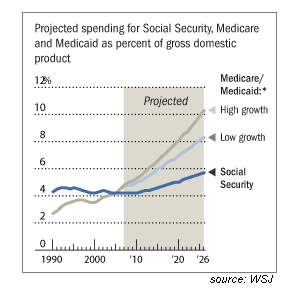

|
| weblog/wEssays | home | |
|
The Chickens Are Coming Home to Roost (February 6, 2006)  A good friend was describing the college savings plans she was starting for her
daughters, and I suggested that she avoid putting any money in U.S. equity mutual
funds until October. She replied that this was "long-term investing" with a timeline
of 6 or 7 years out, and so she wouldn't try to time the market.
A good friend was describing the college savings plans she was starting for her
daughters, and I suggested that she avoid putting any money in U.S. equity mutual
funds until October. She replied that this was "long-term investing" with a timeline
of 6 or 7 years out, and so she wouldn't try to time the market.
I then said that the country was heading into a great depression which would last 10 or more years. Her response was a stunned silence. Not that I blame her; it just seems crazy to speak of a depression when "everything is going so great." But the hurricane winds of massive wealth destruction are brewing just over the horizon, and it won't be long before intelligent, well-informed people like my good friend start seeing the whirlwind of a 10-year long storm sweeping away all the debt, wealth and excess of the past five years of phony prosperity. For your consideration: the charts which predict the storm. As described in the Wall Street Journal of 2/3/06, the medical entitlement programs alone are on course to eat up 22% pf the nation's GDP in a few decades--a share larger than the entire Federal government today. Budget Wish Lists Come and Go,But 'Entitlements' Outweigh All: But the significance of Bush's proposals and Congress's response is dwarfed by one daunting fact: Some 84 cents of every dollar the government spends is essentially committed before he and the legislators even have at it.Then there's the news which rocked the stock market: productivity drops as wages rise. Allow me to summarize these two stunning developments: Since the late 90s, the "story" was that rising worker productivity in the U.S. would enable the country to pay for the huge entitlements due the soon-to-be-retiring Baby Boomers. The hefty budget surpluses of those years made this seem possible. Alas, Bush and the Republicans gave away the $1.6 trillion (says the Wall Street Journal) surplus in tax cuts to the wealthy, so now there are deficits farther than the eye can see. Now we find that the "miracle cure" of productivity is slowing, even as wages are finally rising after 5 years of flatlining. American workers don't need to be told how this "miracle of productivity" works--benefits have been slashed, support staff axed, more work loaded onto workers with no equivalent increases in pay. But now there are fewer such ways to increase productivity, and so naturally the "miracle" goes away. The Federal budget deficit, we now learn (not exactly news if you read anything at all) is "unsustainable," and either taxes will have to double or America's favorite welfare programs for the middle-class (Social Security and Medicare) will have to be cut in half or more. The WSJ failed to mention the other elephant in the room: rising interest payments on the Federal debt. As wage inflation kicks in and productivity falls, and as the systemic inflation of rising energy costs become visible, then inflation (and thus interest rates) will have to rise. If interest rates rise to a historically middle-of-the-road 8%, the cost of the interest paid on the National Debt will double to $400 billion a year--more than the entire "discretionary" part of the budget. If you can't see the storm ahead, I fear you are in severe denial. * * * copyright © 2006 Charles Hugh Smith. All rights reserved in all media. I would be honored if you linked this wEssay to your site, or printed a copy for your own use. * * * |
||
| weblog/wEssays | home |